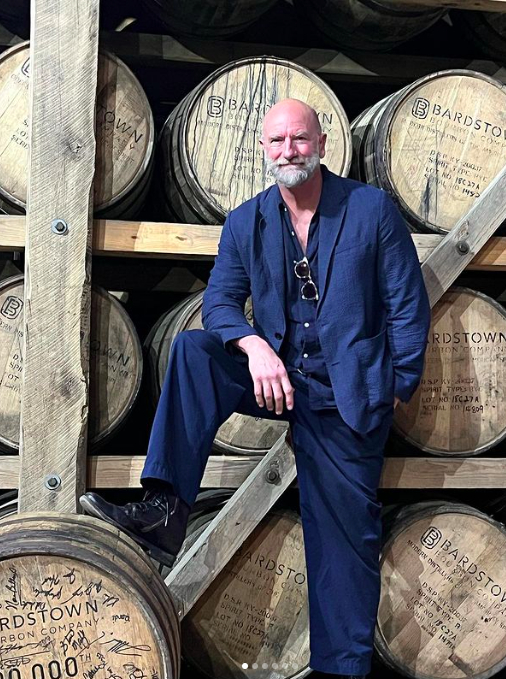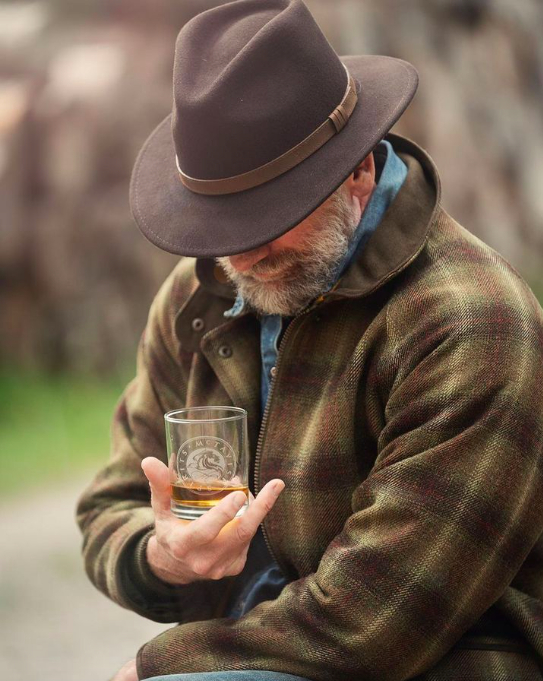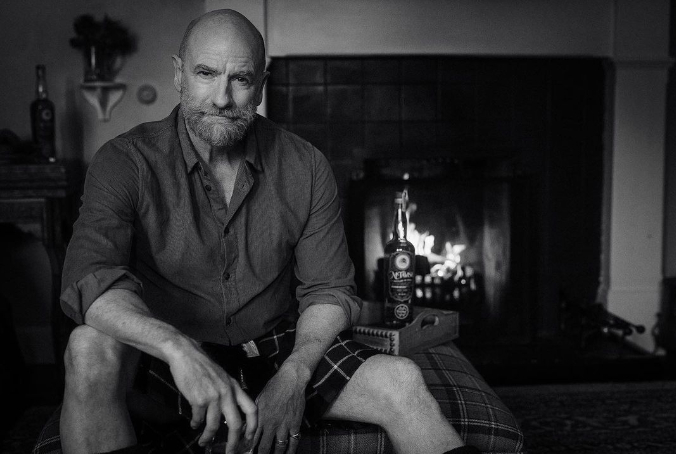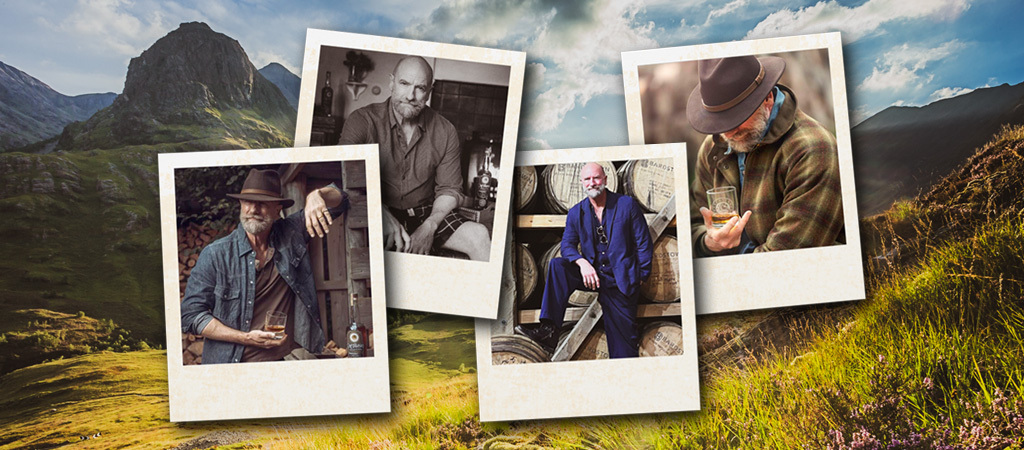There’s a good chance you’ve seen Graham McTavish on TV. The Scottish actor is everywhere on prestige streaming from House of Dragons to The Witcher to the insanely popular Outlander and the gloriously pulpy Preacher. And that’s before you take into account his film career which spans epic blockbusters like the Hobbit series, Rambo, Creed, and so many more.
But I’m not here to lay laurels at the feet of a great character actor, I’m here to talk whiskey.
McTavish just started a brand-new venture with the team at the Bourbon With Friends Podcast (Paul and Connor). And while McTavish is a good Scotsman, his true passion is for bourbon. So he and the team at Bourbon With Friends founded a brand new bourbon brand to fulfill his passion for the American spirit, inflected with Scottish influences.
They hit it out of the park. The seven-year-old bourbon is a bottled-in-bond batch with truly deep and delicious bourbon notes with a classic edge that goes deep. Long story short, it’s worth checking out and talking about. Which … is much rarer than you might think in the wide world of celebrity-built whiskey brands.
I was lucky enough to catch up with McTavish recently and talk about how he got from scotch to bourbon, building a palate, and building a whiskey. He also dived into the passion it takes to build a brand and the core purpose of doing so for someone like McTavish. It’s a fun chat and offers a glimpse into building bridges between the world of Scotch whisky and American bourbon.

We all have our own palates that we develop over our entire lives, whether we’re aware of it or not. How did that bring you into whiskey?
Where my palate leads me is that it takes me back to the early stuff, which would be my time with Scotch whisky with my father who introduced me to whisky. It wasn’t unusual for us to toast around the table even when I wasn’t “legally” allowed to do so.
So my palate was informed by obviously being Scottish and growing up with that background. But my father’s palate was very much leaning towards those types of things. So, I’ve always liked Scotch whisky.
That’s a good place to start building a whiskey palate!
It is! And I’m certainly able to distinguish between the different regions of Scotch whisky.
Where did bourbon come in?
It was about 20 years ago when I first moved to America for work that my good friend Nolan North, who is a voiceover actor, invited me over to his house. And I have to confess that I’d never had bourbon before that point.
When I told Nolan that he said to me, “Oh, would you like to have some bourbon at the end of the evening?” And because I’d grown up in that Scotch whisky background, I made the very naive mistake of believing that bourbon was essentially just an American version of scotch, which of course it is not. But there is a kind of built prejudice that they just put an American name on whisky. Which is terrible!
What was that first sip of bourbon like for you?
That was really the moment that where, you know, a little bit of a light bulb went off in my head and in my palate, because I just really loved the taste of it. I liked the sweeter notes and found that I liked bourbon perhaps more than scotch.
What was it exactly that you liked so much?
I liked it sort of … consistency of the taste. I liked the way it rolled down the back of my throat compared to scotch.
It sounds like you were converted on the spot.
I remember thinking, ‘This is really lovely.” But I actually felt terrible. There was a kind of guilt at the same time because … it was almost like heresy as a Scot. And I struggled with that for a long time until I met Paul and Connor in Kentucky. They released me from that guilt because I was able to fully confess and accept that I do prefer bourbon to scotch.
Looking back, what do you still attach to a good pour of bourbon that you look for now?
You know, the kind of things that I detect in bourbon, the kind of things that I hope to find, are the soft vanilla, the spice, that kind of fruit cake and Christmas-y sort of feel. I hadn’t found that with much scotch. But those notes were so present in bourbons and I’ve continued to really enjoy them.
I really love certain things about bourbon and I enjoy them but it’s very difficult for me to sometimes articulate exactly why. That’s why I have benefited so hugely from being educated as well by Paul and by Conor [of the Bourbon with Friends Podcast] in this process. They’ve helped me through this process to understand exactly why is it that I like it.
You know, there’s always a hint of nostalgia that comes along with anything that you drink because that’s sort of how our sensory system works, right? Every tasting note we find is simply a sense memory at the end of the day. Where do those sensory memories take you?
A lot of the whiskey I love are the ones that take me back to usually a nostalgic place but, you know, are lovely too. It gets tangled up in my mind as well, not just in a taste sense, but also the history that I’ve become interested in, in how Bourbon came to be. You know, in my ignorance 20 years ago, I had no understanding at all of what bourbon means to American history.
Obviously, you had the Scots, Irish, English … German influence of the colonists coming over to the East Coast of America. They started with the idea that they wanted to bring their distilling abilities with them because that was what they knew. But they also needed it in their lives. It wasn’t necessarily that they wanted to make loads of money out of it. It was just what they did and they used what was on hand. And then you have what George Washington did with the taxes in the late 18th century where it forced those whiskey makers further West into the Ohio Valley.
I love the happy accidents that occur with these sorts of things. You know, but for that attempt at taxing certain people, they wouldn’t have necessarily moved West. And if they hadn’t moved west, they wouldn’t have discovered that particular limestone seam and the iron-free water and all the rest of it that makes bourbon so, so unique and specific. I love that. I love that journey — that historical journey that bourbon has taken as well.

How did you find the right bourbon for your bottle?
I knew pretty early on that I would want a high rye style because I like that extra spice personally. So I wanted a bourbon that was a little bit over, you know, the 18% mark. I was also really keen on the “bottled in bond” idea because again, historically, that really appeals to me.
We all know that bottled-in-bond bourbon is perceived as “the good stuff,” which is all great. But I liked the reason that that category came about in the whole system in place to assure quality and age in the late 19th century and really drive a premium product.
So I was sort of throwing a lot of things into the bag together with history and with a preference for those spicy notes with a fruity note, and that’s how we came up with our direction for the bourbon in the bottle.
It’s always great to talk about these big ideas — flavor notes, history, etc. — but then the rubber hits the road. How did that ideas translate into action in finding the right bourbon barrels?
Precisely. There was quite a bit of exhaustive R&D with Paul and Conor, which I think, in fairness, they were a lot more prepared for than I was. I drink, sure. I’m used to drinking scotch and other spirits and I’ve had bourbon but not really in the quantities required to find those subtle nuances. So having Paul and Conor there to guide my palate toward something special was a great further education. Being with them, it’s like being with someone who understands something very, very deeply. And that sort of infects you in a good way.
It’s exciting when you’re chasing a great bourbon and find all these paths that you might not have seen or tasted before. How many barrels did it take to really zero in on the best ones for you?
I was fortunate that I had quite a lot to choose from in those R&D sessions that narrowed it down. After that process, the choices were narrowed down to maybe four or five batch options and then we all really loved this one that ended up in the bottle.
Through every tasting and blind tasting and re-blind tasting, that one batch was consistently the winner and loved by all of us. It always got the vote.
Do you feel like your Scotch whisky background is expressed in the bourbon you chose for this release?
For me, the Scottish connection was less about the flavor and the palate in the bourbon and more about my own sort of emotional connection with America now, and that bridge really between the two for me. That really was the big thing.
What’s being bridged there?
Putting aside for a minute that I preferred the taste of bourbon, I felt as being a Scotsman that with my acting career, for instance, I always felt this guilt at not wanting to just do Shakespeare performances on stage. You know, actors as opposed to want to play Hamlet and, and all the rest of it.
And I really understood relatively early on that even though I was in denial about it that what I really wanted to do was do movies and specifically movies that involved action, swords, and all of those sorts of things.
As I’ve done more and more of that sort of work, there was this hold that the old convention of acting had on me. There was this voice that was saying, “No, no, no, no, no, no! That’s not really acting.”
I had that same feeling with bourbon. My roots in Scotland were pulling at me and constantly saying, “Bourbon? Yeah, it’s all great. But it’s not Scottish!” And when I realized that was the same feeling I had about my acting career and that I had ignored that voice, I knew I was on the right path.
I don’t need my whiskey to be Scottish because I’m an actor working in America. So without sounding too full of puns, this bourbon is literally a distillation of my Scottish life, my acting career in America, my bonds with that country, and my growing understanding of that country.
You have a bourbon under your belt so let’s look forward a bit. Where does McTavish Spirits go next?
I definitely want to emphasize that I’m not in this for the short term. I’m not in this as some sort of one-off. You know it and see it just like I do. I’m not some actor just putting my face in front of something and going, “Please, please buy my whiskey…” I actually love this whiskey and I love bourbon. I want to learn more about it.
And there’s just so much of it. There are so many directions that you can go to create and find an amazing whiskey these days.
I like to think that if bourbon is a mountain range, I’m in the foothills of it — barely — and the looming mountain tops that is bourbon are still in the far distance. There’s a long way to go before I ever learn about it all. And the truth is that I’ll never get to the top of those mountains either because it’s like all great mountains, you think you get to the top and then you realize that there’s more to come. But that’s the joy of it as well because while we have plans for what we want to do, there are things that will develop that we can’t even imagine yet.
I think that is one of the real joys of any spirit-making. The combinations are almost infinite and it’s the process of trying to find the one that you like and you want to share that is the fun part. The actual getting it out there to people. I just want people to enjoy and share this wonderful bourbon we found.








